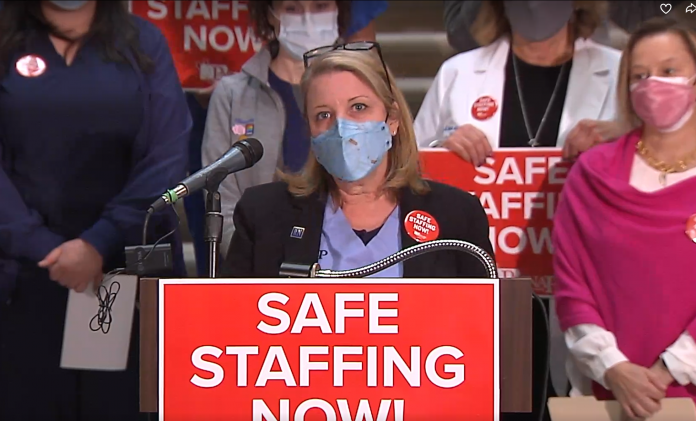It’s been almost a year since state Reps. K.C. Tomlinson and Tom Mehaffie introduced the Patient Safety Act, which would require safe staffing in hospitals across Pennsylvania – something nurses have been calling for since the pre-pandemic days. Despite the bill having 105 bipartisan co-sponsors, which is a majority, it remains trapped in the House Health Committee.
The committee’s chair, state Rep. Kathy Rapp, recently stated that she won’t move the Patient Safety Act to the House floor for a vote because she has yet to hear a “real grievance” about unsafe staffing in hospitals. She said, “I do not believe that legislators who are not on the frontline have a real idea what goes on every day in the hospital, and I believe that is best left to the administration of the hospital and the staff that work there.” Rapp added that it would be “very irresponsible” to pass the legislation.
On the morning of Jan. 25, representatives from the Pennsylvania Association of Staff Nurses and Allied Professionals, SEIU Healthcare PA and the Pennsylvania State Nurses Association convened in Harrisburg to explain how desperately they want the Patient Safety Act (HB 106) to be passed.
Leading the conference was Maureen May, president of PASNAP and nurse of 37 years who works in Temple University Hospital’s NICU. As the chair of the hospital’s staffing committee, May shared that in 2021, she received 1,500 grievances from nurses, who felt overwhelmed and burnt out because of short staffing. Each of these grievances, said May, is a chance for a nurse to do harm to a patient. Though this is the last thing they want to do as healthcare professionals, when they’re forced to care for extra patients with little to no breaks, it’s always a possibility.
“We are in crisis and this will help resolve the crisis,” said May. “We came here in September to lobby for this bill and Rep. Rapp decided that she would cancel her appointment with us. She also has decided to run away from us when we saw her in the hallway. How could you listen to a grievance when you cancel meetings and you run away from the nurses, the most trusted profession?”
Debbie Vandover, an ICU nurse representing PSNA, recently witnessed four nurses give their resignation within a three-week period because of burnout. In the ICU, where nurses should only be assigned one patient, they’re caring for two. Lack of staff in the ICU is dangerous, she said, because patients must be turned every two hours. Sometimes, this doesn’t always happen, which results in pressure injuries. Vandover added that the short staffing crisis existed long before the pandemic. COVID-19 just “supercharged” the issue.
Tomlinson and Mehaffie took the reins from Bucks County Commissioner Gene DiGirolamo, a former state representative who was passionate about this issue throughout his tenure in office. At the time the Patient Safety Act was introduced, Tomlinson said, “Nurses across the state are being assigned an increasing number of patients per one nurse, all while staffing levels continue to decline. That combination, along with COVID-19, can have serious consequences for our nurses and patients.”
The Patient Safety Act would set appropriate nursing ratios for Pennsylvania hospitals dependent upon the acuity of the unit’s patient needs. The basic principles of staffing in hospital settings would be based on the individual patient’s care needs, the severity of the condition, services needed and the complexity surrounding those services.
“I believe the job of a nurse is hard enough. Just look at what this year [2020] has thrown at them,” added Tomlinson. “They have held the phone so loved ones could say their final goodbyes, then held the hands of those taking their last breath so they did not die alone. Passing the Patient Safety Act should not be complicated. It is basic decency and common sense.”

During last week’s conference, Mehaffie thanked the more than 60,000 nurses who have helped him and Tomlinson bring the Patient Safety Act into the public spotlight.
“We have to pass this through the House, through the Senate and get it to the governor as soon as possible. Two hospitals closed at the end of last year. Two. We are in a healthcare crisis. We have issues beyond belief when it comes to this system. We have issues with agency nurses, we have issues with nurses leaving the profession. We have 80,000 licenses in escrow,” he said. “We call them heroes. We know they’re there for us when we’re sick, but we can’t get this done? I don’t understand it.”
Also present was state Sen. Maria Collett, who introduced the Patient Safety Act (SB 240) in the Senate. This version of the bill has 23 co-sponsors, which is almost a majority. As a nurse, Collet has also seen firsthand the mass burnout among her peers.
“Today, the legislature is sitting on billions in American Rescue Plan funds and a booming surplus in our General Fund. We have a unique opportunity to deliver to the healthcare heroes who have stayed at the bedside and done their best to deliver the care our friends, our families and our loved ones all deserve,” she said. “Safe staffing saves lives and we have no time to waste.”
May concluded the conference by drawing attention to TellKathyRapp.com.
“Let Kathy Rapp know that there are grievances, she’s just not hearing us,” said May.
Samantha Bambino can be reached at [email protected]


